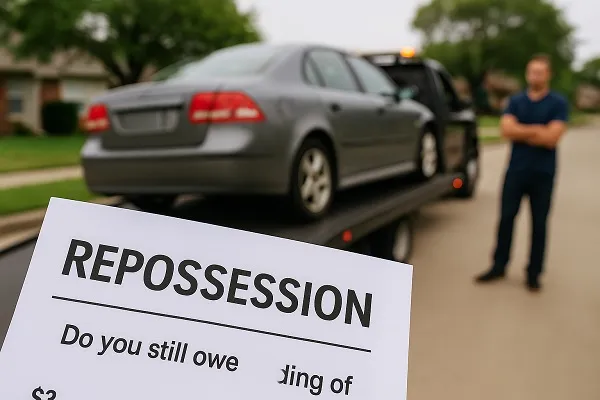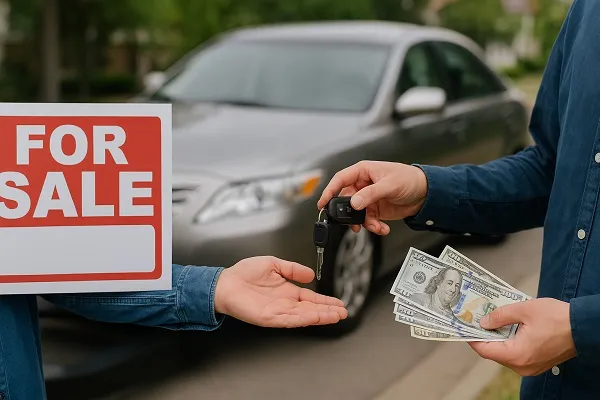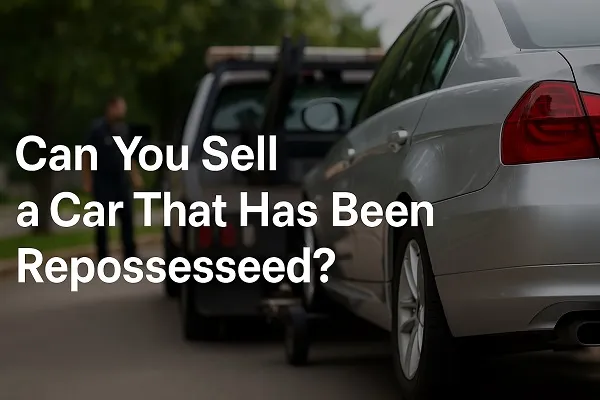If you’re wondering whether you can sell a car that has been repossessed, the short answer is: not unless you regain ownership or satisfy the lender’s requirements first. When a car is repossessed, the lender takes back possession due to missed payments or breach of the loan agreement. This raises legal and financial complications for anyone hoping to sell the vehicle.
Understanding the process of repossession, what your rights are, and how to recover or sell a repossessed car is crucial before making any decisions. Let’s explore this topic in depth.
What Happens When a Car Is Repossessed?
Repossession occurs when the borrower fails to make payments as agreed in the auto loan contract. In most states, the lender has the right to reclaim the vehicle without going to court, as long as they do not “breach the peace” (e.g., force entry into a garage).
Here’s what typically happens:
- The lender hires a repossession company to tow the vehicle.
- The borrower is notified after the repossession.
- The lender may give the borrower a chance to pay off the balance or the defaulted amount.
- If not resolved, the vehicle is usually sold at auction.
Once repossession takes place, the borrower no longer has ownership of the car. That means you can’t legally sell it unless certain steps are taken.
Do You Still Owe Money After Repossession?

Yes, and this surprises many car owners. Just because the vehicle has been taken doesn’t mean your debt disappears.
Here’s what you might still owe:
- The deficiency balance (difference between loan balance and sale amount at auction)
- Late fees and penalties
- Repossession and storage fees
- Interest that continues to accrue
Even after repossession, your credit score is damaged, and the lender can pursue you for any remaining balance. This can make future financial activity, like getting a car loan or mortgage, more difficult.
Can You Sell the Car After Repossession?
If the Car Has Already Been Repossessed
If the vehicle has already been taken, you cannot sell it, because you are no longer the legal owner. The lender holds the title and full rights to the vehicle.
Your options at this point include:
- Redeem the vehicle: Pay off the full balance to regain ownership.
- Reinstate the loan: Pay the past-due amount and fees to bring the loan current.
- Negotiate with the lender: Try to reach a settlement or payment plan.
Only after you recover the title or reinstate the loan can you legally sell the car.
If Repossession Is Pending
If you’re behind on payments but the car hasn’t been taken yet, you still own the vehicle, which means you can technically sell it — but it comes with strings attached.
Here’s what you’ll need to consider:
- You must disclose the loan to the buyer.
- The loan must be paid off during the sale (either by you or directly by the buyer).
- Selling a car with a lien can complicate the transfer of ownership, especially with private sales.
Selling a Car with a Lien: What You Need to Know
If your car has a lien from the auto loan lender, the title is not “clean.” This means you don’t fully own the car, and the lienholder has legal rights over it.
Selling a car with a lien involves:
- Contacting the lender to get a payoff amount.
- Arranging a sale where the buyer pays off the loan, often directly to the lender.
- Ensuring the title is released once the loan is cleared.
Some buyers (especially dealerships) are comfortable handling lien payoffs. But private buyers may be hesitant because of the added complexity.
Can You Voluntarily Surrender the Car and Then Sell It?
Voluntary repossession, or voluntary surrender, is when you return the car to the lender instead of waiting for it to be taken.
While this may slightly reduce repossession costs, it doesn’t change your ability to sell the vehicle. Once you surrender the car, you lose ownership — same as if it were forcibly repossessed.
What Are Your Options to Avoid Repossession?
If you want to avoid repossession and preserve your right to sell the car, here are some potential strategies:
1. Refinance the Auto Loan
- Get a new loan with lower payments.
- Avoids repossession and gives you time to sell.
2. Sell the Car Before It’s Taken
- Be transparent with the buyer about the loan.
- Use the sale proceeds to pay off the lender.
3. Negotiate with the Lender
- Ask about deferment, reduced payments, or loan modification.
4. Voluntarily Surrender the Car (Last Resort)
- Slightly less damaging to your credit than forced repossession.
- May reduce fees but doesn’t avoid debt.
How to Sell a Recovered Car After Repossession

If you’ve managed to pay off the loan or buy back the repossessed car, you can sell it like any normal vehicle.
Steps to follow:
- Ensure the title is in your name.
- Confirm there are no liens remaining.
- Clean and repair the car to increase resale value.
- Get a current valuation (using Kelley Blue Book or Edmunds).
- Choose a selling method (private buyer, dealer, online marketplace).
- Be honest about the car’s history — some buyers may ask if it’s been repossessed.
What Happens If You Sell a Car That’s Been Repossessed Illegally?
Attempting to sell a car that’s been repossessed — while not owning it — can lead to serious legal consequences, including:
- Fraud charges
- Civil lawsuits from the lender or buyer
- Financial liability for damages
If you’re unsure of your legal rights or loan status, always consult with your lender or an attorney before proceeding with a sale.
Repossessed Vehicle Sales: Lender’s Role
After a car is repossessed, the lender typically sells it at auction. By law, they must notify you of:
- The date and location of the sale
- Your right to redeem the vehicle before it’s sold
- The sale price (after it happens)
If the car sells for less than what you owe, you’ll be responsible for the difference. This is called a deficiency balance.
Some states require lenders to sell repossessed vehicles in a “commercially reasonable” manner. If they don’t, you may have legal grounds to challenge the deficiency.
Bottom Line
You cannot sell a car that has been repossessed unless you’ve fully recovered ownership. The lender has legal rights to the vehicle once it’s taken, and attempting to sell it afterward is illegal. If the car hasn’t yet been repossessed, and you’re behind on payments, you may still be able to sell it — but only if the lien is paid off in the process.
If you’re facing repossession, acting quickly gives you more options. Whether you’re looking to refinance, sell, or surrender the vehicle, understanding your legal and financial obligations will help you make the best decision.
Content reviewed and published by Sell My Car Colorado Editorial Team.
